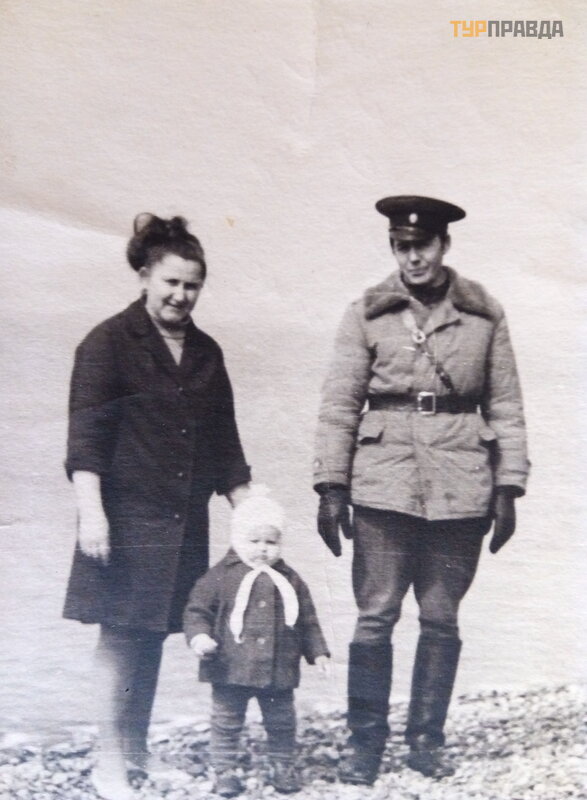Walk in childhood or walk to Turkey!
The mysterious word "Sarpi" in our family has always been pronounced with a slight hint of delight and admiration. 45 years ago, my father was the head of the Sarpi frontier post on the border of the USSR and Turkey, on the Black Sea coast. Incredibly lucky - the nature there is amazing. Low mountains, subtropical climate, tangerines on the street and crystal clear water on a pebble beach.
The border divided the tiny village of Sarp (Sarpi) in half, along a deep gorge. Relatives shouted to each other across the border, equipped with wire, towers and searchlights. Occasionally, Turkish relatives came to visit Soviet ones - through the Bosphorus, Moscow and Tbilisi. The outpost stood right on the beach, the territory was closed, so my mother and I and the family of the political officer were, in fact, the only vacationers.
 The tower on the left is Turkey
The tower on the left is Turkey
I was only two years old then, so I knew about the beauties of Sarpi only from the memories of my parents and muddy photographs. The legend about how the political officer’s wife dropped her wedding ring while swimming, which was visible from the boat, but no one managed to dive to it (there was such clear water and great depth in that place), has become practically a family one.
After that, our family served in Armenia, Azerbaijan, Moscow, Khabarovsk, Riga. But Sarpi remained the best place on earth for my parents. Decades passed, we settled in Ukraine, my father died, I grew up, my mother became a little older. Mom didn’t even think about going abroad. And only after Ukraine was given a visa-free regime, and stories about the availability of movement across the cordon turned into everyday and ordinary ones, I unexpectedly managed to persuade my mother to make a passport. The key word was "Sarpi". I promised to take my mother there. In her youth…
Mom was nervous. I was nervous when I received my passport. I was nervous when I looked at web maps of Batumi and developed a route. I was nervous when, 15 hours before departure, we were stunned by the news that our room in the Batumi hotel had been sold twice, and the travel agency, at its own expense, settled us in a five-star hotel on the first line from the sea. She experienced the first shock when she saw tickets and a voucher to the hotel - just sheets of paper printed on a printer.
The second shock for my mother was at the Odessa airport. There was a check-in for five flights at once, and my mother, who had worked in the library for two decades, was dumbfounded by the number of passengers. It turns out that the price of an air ticket, equal to the monthly salary of a librarian, is not an obstacle to the travel of hundreds of people. And she practically did not notice the border crossing. And flying in a Boeing is a little more comfortable than the Tu-134.
The third shock - in Batumi, passengers were met not by barbed wire, but by friendly Georgian border guards, lack of baggage checks and free guides to Adjara. We were still waiting for a transfer to the hotel in the face of a shaggy girl in torn jeans.
I will try to tell about Batumi separately, there are too many impressions. Here, not only my mother was already shocked. . . The bizarre architecture, the ghostly green palm trees of the night embankment, the fantastic view of Batumi from the sea at sunset. . . The most important thing is that after the collapse of the USSR, Ukraine and Georgia started at the same time, but the tourist infrastructure of Batumi is an order of magnitude higher than Odessa. Alas.
Weather sites stubbornly promised rain and thunderstorms for Batumi, although in reality it was sunny, humid and stuffy. I decided not to risk it, and on the third day of my stay in Batumi, seeing a relatively clear sky, I announced that today we were going to Sarpi.
Guidebooks reported that Sarpi can be reached by buses No. 16 and No. 17. The stop was two steps away, we honestly waited for the bus for about five minutes. A group of young guys stopped a minivan taxi, I heard the cherished “Sarpi”, and here we are eight together going to the border with Turkey in a taxi for 20 GEL.
45 years have changed everything around. They cut through the mountain, strengthened the slopes, and now a wide road full of trucks leads to Sarpi. They demolished the outpost and part of the village. At this place, there is now a border crossing of an unimaginable wave-like shape. Nearby is a dusty little market, a parking lot and points for changing currencies. Noisy and restless.
 Georgia-Turkey border crossing
Georgia-Turkey border crossing
The beach has been preserved. Pebbly, wide enough and with some completely invisible division between Georgia and Turkey. There are just a couple of warning boards, and even a Georgian border boat is rocking in the sea. That's the whole border. There is no wire, towers, restricted lane. Now this is the favorite beach of native Batumi people. Because of the port, they consider the sea in Batumi itself to be dirty, and they come to Sarpi to swim with children. There are several mini-hotels here for lovers of a sleepy beach holiday. Although the track and trucks spoil the impression.
I remembered dad, she cried. Mom was kind of stunned and a little depressed. We had to save the situation. And I made a crazy decision from my mother’s point of view - to take a walk to Turkey. On foot. There were few people at the pedestrian crossing, I prudently took my passports with me, visas are not needed. And we went to Turkey.
Mom walked at first obediently aloof (she did not believe in my adventure). But at the border crossing it revived, and after five minutes the Georgian border guards were already getting acquainted with a cheerful elderly lady, whose husband guarded the border here, when they were not yet on earth. A slap in the passport, and we are abroad. One more slap and we are in Turkey! While walking along the corridor, I frantically recalled all my meager English. Not needed - no questions asked. Crossing the border took about 10 minutes, and for the first time in her life, my mother looks at the places of her youth from the most unexpected point for her - from the very mosque that she and her father looked at for almost two years from the border tower.
After arranging a mini-photo session and tasting delicious Turkish ice cream and strong Turkish coffee, we went back to Georgia. It was possible to take a minibus and ride to the nearest Turkish city, but we were not interested in clothes, it was hot outside, so after 50 minutes we decided to return.
On the way back, another shock awaited - from Turkey to Georgia, at the same time with us, another five thousand people decided to cross the border. Even the division of the flow into Turkish citizens and foreigners did not speed up the movement. We crossed the border back for about an hour. A multilingual crowd hummed around, half-dressed European women and Muslim women in veils stood in the same row, local business boys scurried around with cold water, mobile phones rang. The crowd was dense and nimble, like a school of sprat. No one really inspected bags, suitcases, bundles and trunks. Stamp in the passport - transition - stamp in the passport - we are in Georgia!
So, unexpectedly, my family legend about Sarpi found material confirmation in my passport. Now there is a Georgian stamp "Sarpi" and a Turkish "Sarp". And my mother briefly returned to her youth. No outpost, Union. Dad, alas, is not there either. Only the mountains and the sea remained. And mom.




















